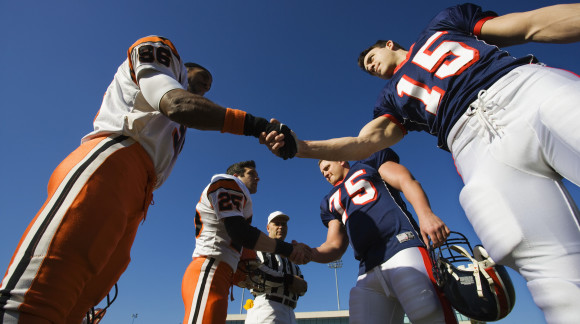What is Good Sportsmanship?

The Keys to Good Sportsmanship
Good sportsmanship, at any level of team or individual play, requires that all participants treat each other with respect. From young children playing on intramural teams to professional athletes across the globe, teammates, opponents, coaches, vendors, officials, and fans should show respect to everyone involved in the sporting event. Players and coaches who exhibit sportsman like behavior are the real winners of any game, in that they know how to behave in a positive manner, regardless of the score or outcome of the game.
Sportsmanship on the Field
There are many different aspects of good sportsmanship, and no one action or behavior singularly constitutes good sportsmanship. Players should always play fair, follow the rules of the game, respect the judgment of the officials and treat opponents with respect, even if their opponents do not treat them with similar respect.
Respecting the opposing team can be as simple as shaking hands following a game, or acknowledging a good play made by another player. It is also having the grace to accept a bad call by an official without complaint and moving on to the next play. When you win a game, good sportsmanship means not gloating or bragging about your successes, but being quietly proud of your win. In the same respect, when you lose a game, it means accepting defeat, congratulating the winner promptly and voluntarily, and not making excuses for your performance.
Athletes should also keep in mind that in some sports and leagues, unsportsman like behavior can lead to forfeiting your win. Many games have been lost due to penalties for unsportsman like conduct, even based on the bad behaviors of parents or spectators.
Sportsmanship off the Field
Sportsmanship also extends to spectators, cheerleaders, and parents watching the game. Negative shouts and criticism of coaches, officials, and players are not displays of good sportsmanship. Good sports support and cheer on their team, while bad sports taunt the referee, trash-talk the other team, and yell at a child’s coach for what a parent thinks is a poor coaching decision.
Sportsmanship can be compared to the “golden rule” mentioned in the Bible: you should treat your teammates, coaches, opponents, and officials in the same manner as you wish to be treated. This type of behavior shows respect for others, respect for yourself, and respect for the game.
Benefits of Good Sportsmanship
We often forget that good sportsmanship extends to actions off the field. When you are respectful of your fellow athletes, you tend to be more respectful of the people around you in other settings, such as your work environment.
By treating customers, co-workers, and supervisors in the same manner you want to be treated, you are likely to improve your chances of career success. Likewise, by learning to work as part of a team, appreciating the contributions of others, and keeping a positive attitude despite setbacks, you are more likely to succeed in your personal life as well.
The act of being respectful is one that is universally recognized. By honoring the game and displaying polite and appropriate behavior you gain more fans and make the game more enjoyable to the masses. After all, that is what it is all about, right?
Additional Resources
- Sportsmanship Articles, by the Los Angeles Times
- Good Sportsmanship, by NBA.com
- Sore Loser, Teach Kids Good Sportsmanship, by Parents Magazine
- 10 Tips for Being a Good Sport, by Fpsports.org
- Good Sportsmanship for Adults, by Kids health.org from Nemours
Videos
- Unprecedented Sportsmanship, by YouTube
- How to teach Your Child about Healthy Competition, by Greatschools.org
- Top 10 Bad Sportsmanship Moments, by YouTube
Books
- The Kids and Parents Book on Good Sportsmanship, by Leslie Susskind
- Winning, Losing and everything in Between, by Therese Kauchak
Education
- The story of Good Sportsmanship, by Ryan Seacrest for On The Pitch
